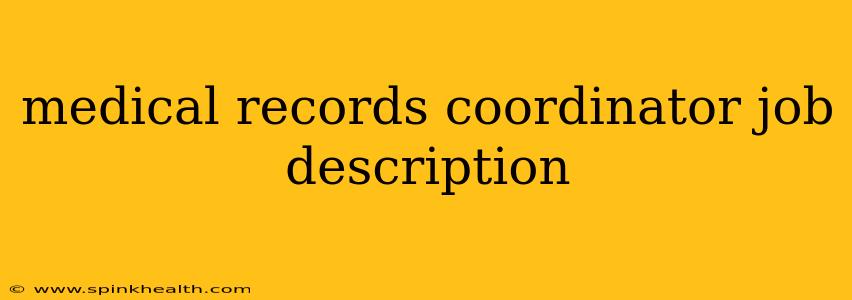Medical Records Coordinator: The Unsung Hero of Healthcare
The whirring of the fax machine, the gentle tap-tap-tap of keys, the quiet satisfaction of a perfectly organized file – these are the sounds of a medical records coordinator's day. While not always in the spotlight, this crucial role is the backbone of efficient healthcare operations. It’s a job that requires meticulous attention to detail, unwavering organization, and a deep understanding of medical terminology and HIPAA regulations. If you're detail-oriented, love a good organizational challenge, and thrive in a fast-paced environment, this might be the perfect career for you.
Let's dive into what a typical day might look like for a medical records coordinator and explore the skills and responsibilities that define this vital position.
What Does a Medical Records Coordinator Do?
Imagine a bustling hospital or clinic, overflowing with patient information – everything from lab results and doctor's notes to insurance claims and billing codes. The medical records coordinator is the conductor of this symphony of data. Their responsibilities are wide-ranging and crucial for the smooth operation of any healthcare facility.
A day in the life might involve:
- Maintaining patient files: This includes both physical and electronic records, ensuring accuracy, completeness, and accessibility. Think of it as being a librarian for medical information, meticulously organizing and cataloging each piece of data.
- Processing requests for medical records: This involves handling requests from patients, physicians, insurance companies, and other authorized entities. Each request requires careful review to ensure compliance with HIPAA regulations and the release of only authorized information.
- Data entry and record management: This goes beyond simply filing; it requires accurate data entry, updating records, and maintaining the integrity of patient information within the electronic health record (EHR) system.
- Coding and billing support: Understanding medical coding (like ICD-10 and CPT codes) is often part of the job, assisting in the accurate preparation of claims for insurance reimbursement.
- Quality control and auditing: Ensuring the accuracy and completeness of patient records is paramount. This involves regular audits and quality control checks to identify and correct any discrepancies.
- HIPAA compliance: Protecting patient privacy is non-negotiable. Medical records coordinators are on the front lines of ensuring strict adherence to HIPAA regulations.
What Skills Do I Need to Be a Medical Records Coordinator?
Beyond the day-to-day tasks, specific skills are essential for success in this role. These include:
- Strong organizational skills: This is the cornerstone of the job. The ability to manage large volumes of information with accuracy and efficiency is paramount.
- Attention to detail: Even a small mistake can have significant consequences. Meticulous attention to detail is crucial for accuracy and compliance.
- Medical terminology knowledge: Understanding medical terminology is essential for navigating the complexities of patient records and communicating effectively with healthcare professionals.
- Computer proficiency: Medical records coordinators work extensively with computer systems, including EHRs and other data management software. Proficiency in Microsoft Office Suite is also highly desirable.
- HIPAA compliance knowledge: A deep understanding of HIPAA regulations is critical for protecting patient privacy and ensuring compliance with legal requirements.
- Excellent communication skills: Interacting with patients, physicians, and insurance companies requires strong written and verbal communication skills.
What Education and Experience Are Needed?
While specific requirements vary by employer, most medical records coordinator positions require at least a high school diploma or equivalent. An associate's degree in health information technology or a related field is often preferred, and a certification such as the Registered Health Information Technician (RHIT) can significantly enhance career prospects. Prior experience in a healthcare setting is also beneficial.
What are the Career Prospects for a Medical Records Coordinator?
The demand for medical records coordinators is consistently strong, driven by the increasing volume of electronic health records and the growing need for efficient and compliant data management within the healthcare industry. Career progression opportunities exist, leading to roles such as supervisor, manager, or even specialized roles within healthcare information management.
How Much Does a Medical Records Coordinator Make?
Salary varies depending on location, experience, and education level. However, a competitive salary and benefits package is typically offered, reflecting the importance of this crucial role in the healthcare system.
What are the Challenges of Being a Medical Records Coordinator?
The job can be demanding, requiring long hours and a high level of accuracy under pressure. Maintaining confidentiality and complying with complex regulations adds to the challenges. However, for those who thrive on organization and accuracy, the rewards of contributing to efficient and safe patient care are significant.
This comprehensive overview provides a clear picture of what it takes to become a successful medical records coordinator. It's a career that demands precision, organization, and a dedication to patient care—a crucial role in the complex tapestry of modern healthcare.

